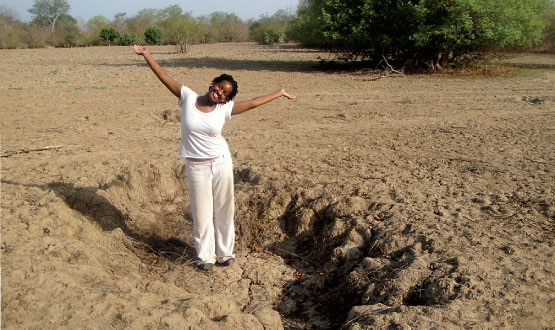A Different Home
Merema Ahmed’s sense of adventure was a definite asset when she went abroad as the first recipient of Vassar’s Ghana Fellowship this spring.

In the middle of the first week of her fellowship, officials from the School for International Training (SIT), where Merema Ahmed ’12 was studying, drove students to the middle of Accra and left each with an assignment. Hers was to find a hair salon, inquire about prices and hairstyles, and then visit a market to purchase cassava, a root vegetable essential to Ghanaian cooking. After completing their tasks, they were to find their way back to the school. Ahmed felt intimidated at first. She had been in the country only a few days and had barely begun to learn Fante, the dialect spoken by most in Central Ghana, but she found herself the recipient of true Ghanaian hospitality.
The “Urban Drop-off” exercise is an apt metaphor for cultural immersion. After all, learning about a culture is as much about knowing the day-to-day activities of its people as it is about learning the history, language, and politics of a place. To foster such cross-cultural exchanges Vassar trustee Paula Williams Madison ’74 and her niece Lynai Williams Jones ’92 funded the Ghana Fellowship in 2009. Their aim was to help students from the African Diaspora learn firsthand about the African continent and their ancestral heritage while studying and working in programs in their fields of interest. Students who learned about other cultures, they reasoned, would be better able to understand the environmental, economic, health, and social challenges of the 21st century.
Ahmed and her classmates attended two lectures per day on topics as diverse as Ghanaian history, politics, and traditions; the country’s agricultural practices; and contemporary Ghanaian art. The class also took excursions to sites around the country, including a “slave castle” on the Atlantic coast where Africans got their last glimpse of the continent before being shipped to America and the West Indies. The visit was particularly touching for Ahmed.
The history major says: “At Vassar, my professors have done a wonderful job of preparing me to understand the fundamentals of what I’m researching—the African Diaspora. But you can’t really imagine something fully until you’ve experienced it. In Ghana, I was able to gain a human perspective on what I’ve learned, and that completed the framework for my studies.”
Living with a warm, accommodating host family—“Mama” and “Papa” Kum, their two daughters (ages 19 and 24), and grandchildren (ages 12 and 6)—helped, too. Ahmed and her roommate Hannah, a junior from Smith College, found the family’s assistance with Fante particularly useful.

Ahmed, whose father was born in Ethiopia, had never visited the African continent until she was chosen for the fellowship. She notes a certain “disconnect” between those in the African Diaspora and those who live on the continent of Africa. “Some students of color [from the U.S.] expected to adjust a little easier and to feel they were ‘coming home’ to Africa,” she reports, “but many were disappointed to find that they did not. We learned about the implications of identity constructions within the African Diaspora and where we stand today as Black Americans and Africans—though the latter identity is often rejected. It was really eye opening.” As she and other students became acculturated to Ghana, Ahmed says, their experiences amounted to “feeling at home in a different home.”
The Ghana Fellowship has left her buzzing with curiosity. Before attending SIT, she knew nothing about Africa’s eastbound slave trade across the Indian Ocean—it’s a subject she had not seen fully explored elsewhere. Following the intellectual “bread crumbs” may lead Ahmed to a Vassar thesis project that would expand the history by detailing trans-Saharan trade practices.
“I am forever indebted to both Paula Madison and Lynai Jones for their gifts,” Ahmed says, “and I strongly encourage more students to take advan- tage of this incredible opportunity to study abroad in Ghana.” She hopes the fellowship will help others “open their eyes to wider perspectives,” too.
Read more about Ahmed’s time in Ghana. Visit meremaahmed.wordpress.com. For more information on the Ghana Fellowship, email Lisa Marie Kooperman (likooperman@vassar.edu).
